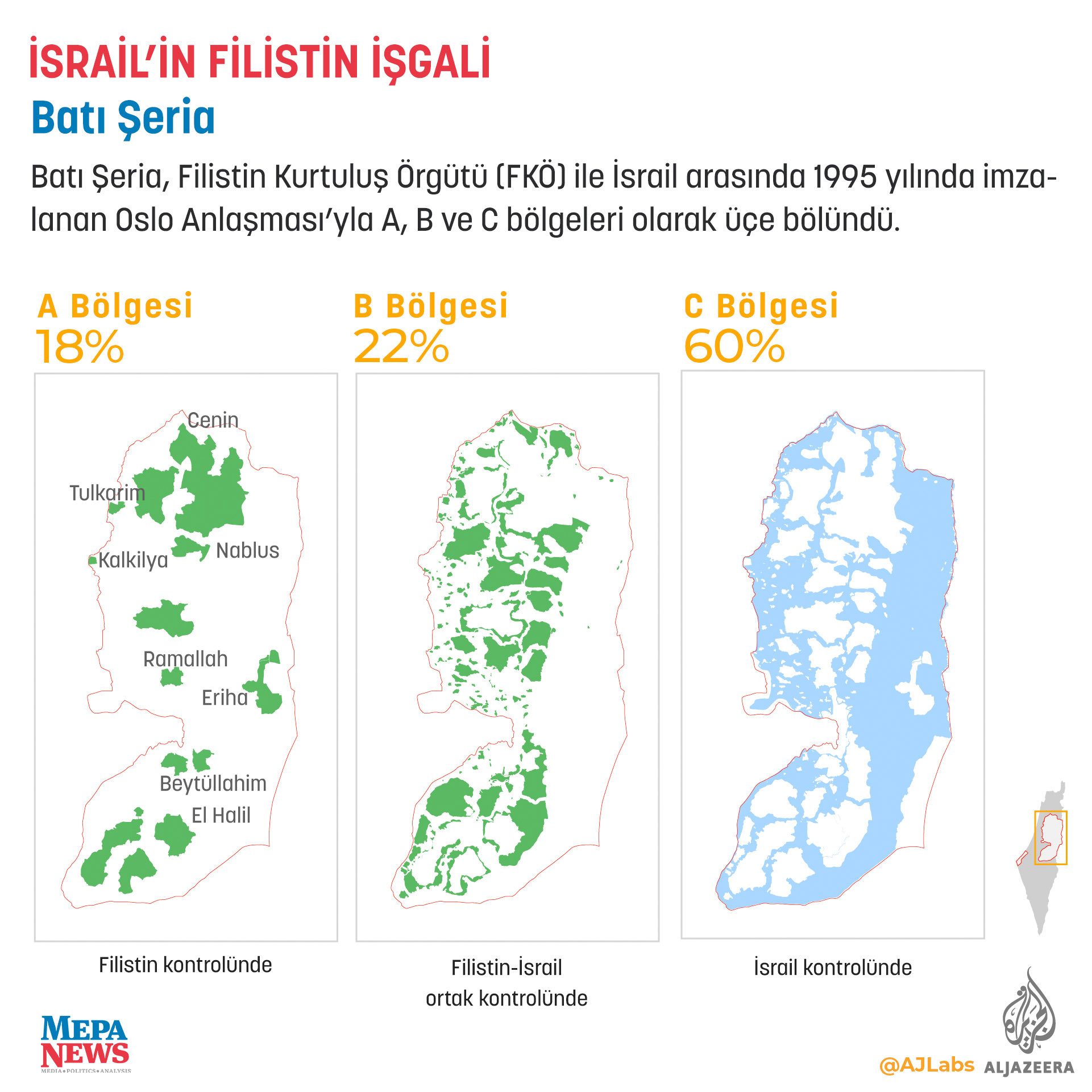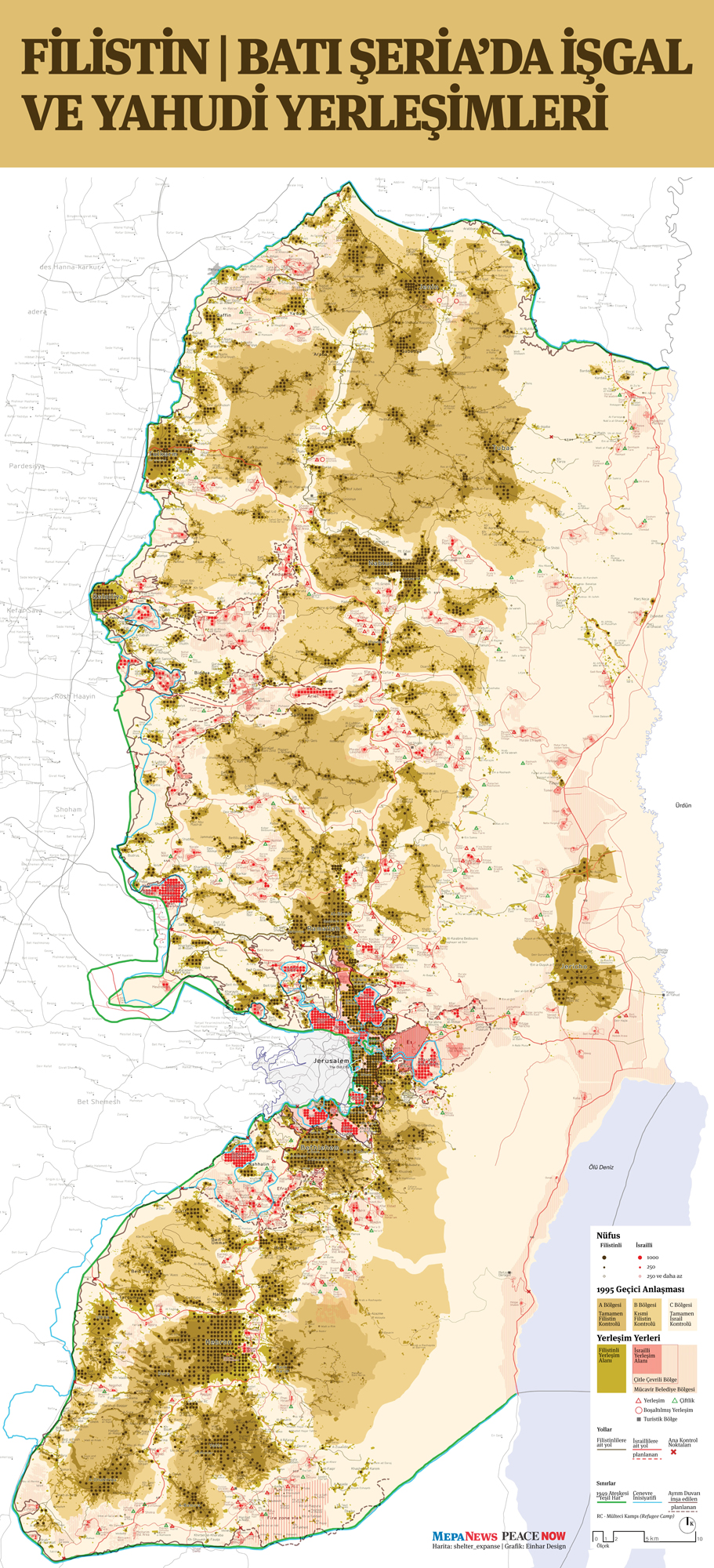Is a two-state solution for Palestine possible?
One of the topics that comes to the surface when the Palestinian issue is discussed is the two-state solution. The two-state solution is still one of the most common proposals adopted in the world to resolve the Palestinian issue.
This proposal is shaped on the basis of the establishment of a Palestinian state in the region according to the pre-1967 borders and the continuation of its coexistence with Israel.
In short, the proposed solution for Palestine is largely as shown in the map below: An Israeli state in the red areas and a Palestinian state with East Jerusalem as its capital in the green areas (i.e. the present-day Gaza Strip and the West Bank).

Obviously, the idea that outcomes that can only come about as a result of extensive historical and social processes can be brought about in this fictionalised way is not very convincing. In other words, by declaring the establishment of the State of Palestine, the realities on the ground, the political and social realities, the military situation and the more complex processes will not automatically improve as if by a magic wand. On the contrary, their stabilisation can only lead to the establishment of the State of Palestine.
In assessing the reality of the two-state solution plan in Palestine, I believe it is necessary to look at the current reality of Palestine.
Understanding the situation in Palestine
As mentioned above, where do the proponents of a two-state solution in Palestine envisage the establishment of a Palestinian State? In the Gaza Strip and the West Bank. This solution must also include a real project to connect these two territories through Israeli-controlled territory. Otherwise, it would be unrealistic to expect a single state to emerge from two divided territories with no land connection.
Let us assume that this problem is solved.
Another territory on which a Palestinian state is envisaged is the Gaza Strip. Today, the Gaza Strip, whose infrastructure is completely destroyed, whose administrative structure and governmental elements have been destroyed, has been levelled to the ground. This is the area which, if a Palestinian State were to be established, would constitute half of its population, its gateway to the world's ports and its most densely populated centre of life. What kind of a state will be created in Gaza, which has already been destroyed?
Let us be optimistic for a moment and assume that this problem has been solved.
The real issue now turns to the West Bank, which is supposed to be the centre of the Palestinian state.
Unfortunately, unlike Gaza, the reality of the West Bank is not fully known by many people. Today, when the West Bank is mentioned, the area that is seen as a whole piece on the map above comes to mind, but this is not the case in the West Bank. On the contrary, the region is devastated and shattered due to the occupation of Israel and Jewish settlers.
In order to understand the situation, it is necessary to take a look at a few maps.
After the 1995 Oslo Accords, only 18 percent of the West Bank is under direct Palestinian control. Israel (directly or indirectly) controls 82 percent of the territory.
When we talk about the West Bank, we are not talking about a solid area, but about 13-14 separate territories that have been cut off from each other and blockaded, and the Israeli checkpoints between these territories.
The areas left under Palestinian control have been militarised by Israel. These areas are constantly subjected to raids and massacres. Infrastructure and superstructure are completely destroyed and cities are rendered uninhabitable.

The map below gives a clearer picture of the situation in the West Bank and how Israel has divided the territory.
The white area is all the territory recognised on maps as the West Bank.
The brown areas are Palestinian settlements. It is important to note how they are separated from each other and distributed throughout the region. Israel controls the roads and transport links between all these disconnected settlements. Hundreds of Palestinian settlements in the region are blockaded by Israeli troops.
The ones in red on the map are the settlements belonging to the Jewish occupiers settled by Israel. Every day, construction continues in the region and the Jewish population is settled there. Thus, both the Palestinian settlements are cut off from each other and the West Bank is being Judaised.
(Click on the map for high resolution.)
In fact, it is virtually impossible under the current circumstances for these isolated Palestinian settlements to even qualify as a common administrative region. Those who closely follow the current situation in the West Bank will realise that it is impossible to create a functioning municipality, let alone a state.
Not to mention how to resolve the Jerusalem issue, which has become an absolute riddle and where Israeli violations have reached their peak.
To summarise, the establishment of a Palestinian state in the region is only possible if Israel makes major concessions, including the transfer of territories it already controls to the Palestinians. No state would willingly hand over a territory under its control to another state. My personal opinion is that Israel will not easily give up the territories it controls, even if it receives very large concessions in return. Moreover, the Israeli administration is fundamentally opposed to the idea of a two-state solution.
At present, Israel will not give land to the Palestinians for statehood when there is nothing to compel it to do so. It is claimed that the states of the region have made the establishment of a Palestinian state a condition for normalisation with Israel, and that Israel may take such a step for normalisation purposes. Personally, I think that these claims are too optimistic and contradict historical realities, because Israel has always achieved what it wanted by using force and has not made any realistic concessions to its neighbours at the table. In return, its neighbours acted as if they were rewarding Israel and continued their relations as if nothing had happened.
When Egypt in 1979, Jordan in 1994, the UAE and other states normalised relations with Israel in 2020, Israel did not make any meaningful concessions, on the contrary, it intensified its attacks on the Palestinian people.
Today, Israel is well aware of the impotence of the regional states in the use of force against it. I believe that Israel is the state that best analyses and understands the regimes in the Arab and Islamic world and best predicts their reflexes. Israel is aware that even if it suppresses the Palestinians by massacring them, it will not have any problems with the countries in the region. Today, once the Israeli army breaks the resistance of the Palestinian people through massacres, it will have diplomatic problems with the Middle Eastern countries only for a few years. Then a new page will be turned between the conflicting sides, and relations will continue as if nothing had happened. This is what has happened since 1948 until today. Israel's neighbours would like to see a change of government in Israel tomorrow, and thus resume relations as if nothing had happened.
Accordingly, I believe that the two-state solution proposals are nothing more than a distraction in today's reality, as there are currently no conditions on the ground that would allow for the establishment of a real Palestinian state.
Under what conditions can a two-state solution be reasonable?
It can be reasonable in a situation where Israel has suffered a heavy blow militarily, is besieged, is largely isolated from its relations with the international order, and its allies, especially the United States, are no longer able to support it and are on the verge.
When Israel is in a situation where it will be forced to step back militarily, politically and economically, it can be worn down by making territorial concessions. Perhaps a temporary agreement for 5 years, 10 years or longer can be concluded in preparation for a final move that will completely solve the Israeli problem and eliminate Israel completely. Just like the temporary agreements concluded by Saladin Ayyubi during the Crusades.
Otherwise, the two-state solution talks will serve nothing but exploiting the dream of a Palestinian state that will never come true and legitimising the Israeli occupation.
The views expressed in this article belong to the author and do not necessarily reflect the editorial policy of Mepa News.









